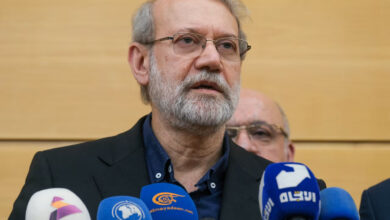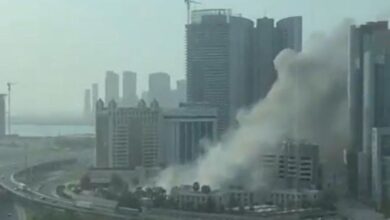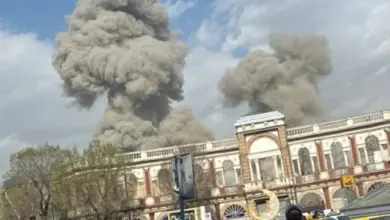Jerusalem – Border walls are the latest fever in the Middle East. It’s not only Egypt, Israel is now playing its trump card in the escalating battle to stop asylum seekers and refugees reaching the country from Sinai. It plans to erect a system of fences and electronic devices along the 266 kilometer long border with Egypt.
The refugees from Sudan, Eritrea, Ethiopia and other African countries pose nothing less than an existential threat to Israel, according to the government.
While Prime Minister Benjamin Netanyahu says the fence will thwart those bent on carrying out terrorist acts, he makes no secret that its main purpose is to stop the flow of African asylum seekers. He claims they will ”flood” Israel unless the fence is built, calling into question its Jewish majority.
”We are talking about a strategic decision to guarantee the Jewish and democratic character of the state of Israel,” Netanyahu said.
Sudanese and Eritreans make up most of the about 20,000 asylum seekers to reach Israel via Egypt since 2005, though there are also increasing numbers of asylum seekers from Ghana, Kenya and Ethiopia.
The Israeli defense ministry declined to answer a query about what would make up the fence. But media reports say that there will be two stretches of double fencing, one stretching for 60 kilometers south from the Rafah area and another stretching the same distance north from Eilat. The area in between the two stretches is seen as an unlikely infiltration venue because of the rugged terrain. Border protection there will depend on electronic sensory devices.
The army began planning the fence in 2005 when it became concerned that after Israel’s Gaza withdrawal, militants from there would use Egypt as a staging ground for infiltration attacks. But Netanyahu’s backing for it now is part of a wider crackdown against the influx, which refugee rights activists say has dropped somewhat recently because of Israel’s policy of rapid returns of refugees to Egypt and shootings of refugees along the border by Egyptian troops. This crackdown includes efforts to pass a draconian new law against ”infiltrators” and those who assist them and stepped up cooperation with Egyptian security forces at the border, including the firing of flares to help the Egyptian troops locate people trying to cross into Israel.
The fence will take two years to construct, according to Netanyahu’s office. It is expected to cost about 400 million dollars. Netanyahu says ”war refugees” will still be able to reach Israel after the fence is built, but rights groups are skeptical.
Shlomo Brom, the former chief of strategic planning of the army general staff says that the fence, combined with detection systems and appropriate troop support can be ”almost fool proof” in blocking infiltrations.
”The contribution of the fence is that it takes time to cross it and this gives time for forces to act.” But refugee rights groups worry that there will be no protection mechanisms at the border and that people will be shot at the fence by Egyptian forces after being locked out of Israel. ”People will still try to cross because they have no other choice and they will die because no one will open the fence for them,” says Sigal Rozen, spokesperson of the Hotline for Migrant Workers in Tel Aviv. Egyptian forces killed 39 refugees trying to cross into Israel during 2008 and most of 2009, according to Amnesty International.
However, in Brom’s view, building the fence could contribute indirectly to better Egyptian-Israeli relations. ”Infiltrations on the border have been a source of friction so this could lead to less friction.”
The government insists the asylum seekers are economic migrants seeking a higher standard of living. But the refugees themselves often have harrowing tales of persecution in their home countries and maltreatment in Egypt. Some mention relatives or acquaintances among the at least 29 Sudanese refugees killed during the protest outside UN refugee agency offices in Mohandisseen in 2005, the same year people began heading to Israel.
The image of an African tidal wave flooding Israel fits in with the government’s ongoing efforts to portray the country as constantly threatened. In November, Netanyahu described Israel as ”the most threatened state in the world.”
This is a government that repeatedly plays on the core fears of public opinion. Tzahi Hanegbi, the chairman of the Knesset’s foreign affairs and defense committee told Israel Radio Monday that there is no alternative to building the fence. ”The infiltration of the migrants is threatening the very existence of Israel and its character.” he said. The country defines itself as both a Jewish and democratic state; something its leaders believe depends on maintaining the country as having a clear Jewish majority.
Hanegbi added that ”because the fence will be built on Israeli territory we do not need the approval of Egypt or coordination with it.” In Cairo foreign minister Ahmed Aboul Gheit said his government had no objections as long as the fence was built on Israeli territory. ”This is a matter which concerns Israel,” AP quoted him as saying. This is something which Israel is building inside its territories, so let it be.”
Critics of the government believe that it is contriving the threat. They note that the government itself issues visas each year to 120,000 non-Jewish migrant workers who arrive at Israel’s borders legally and that hundreds of thousands among the wave of immigrants from the former Soviet Union to reach the country during the 1990’s are not Jewish.
”All of the discourse of danger to the nature of the state is empty rhetoric,” says Dov Khenin, a member of the Knesset.” This nationalist and racist rhetoric is divorced from reality and intended to frighten the Israelis that ‘the Africans are coming’.”
Zahava Galon, a former legislator from the Meretz party, added ” The government does not want refugees here. To speak of people as if they are a ticking bomb is very problematic. Instead of talking about a fence we should be asking what is our universal obligation here? What is our obligation as a nation that banged on other doors when we were refugees?"
Israel has given refugee status to an estimated six hundred of those who arrived from Darfur but has issued expulsion orders against other asylum seekers. The latter live in limbo, unable to work legally but in fact working menial jobs in hotels and as cleaners.
The fence decision comes as the government readies to push through the Knesset legislation enshrining into law the rapid returns of refugees to Egypt without any meaningful review of their asylum claims that rights groups are challenging in Israel’s supreme court. Hundreds, if not more, have been deported in these ”coordinated returns” and some were then forcibly repatriated to Sudan. The same bill specifies prison sentences of seven years to ”infiltrators” coming from ”enemy states” such as Sudan and five years from non-enemy states like Eritrea. Israelis who assist ”infiltrators” will get prison sentences of the same duration under the law.
It also follows revelations that Israeli troops have heightened their cooperation with Egyptian counterparts at the border. According to a government response submitted recently to the Israeli supreme court, at one sector of the frontier, Israeli troops fire flares that illuminate sites where refugees and asylum seekers are crossing.
”Where the Israel Defense Force forces identify a group of infiltrators adjacent to the border, prior to their infiltration into Israeli territory, the forces prepare to prevent the infiltration by means of firing flares into the air in order to draw the attention of the Egyptian forces to the site.”
Israeli troops also use flares to ”signal and notify their Egyptian counterparts of the beginning of a procedure of coordinated return of infiltrators,” the court submission said.
”Signaling by flares, at the beginning of the coordinated return procedure ensures the safety of the infiltrators when they are handed over to Egyptian forces, as well as the safety of our forces.”




